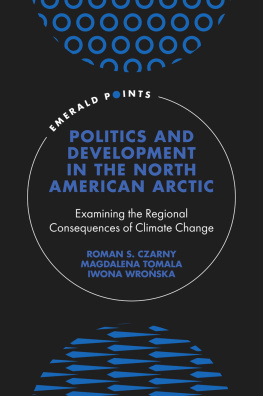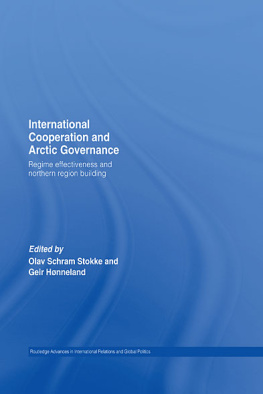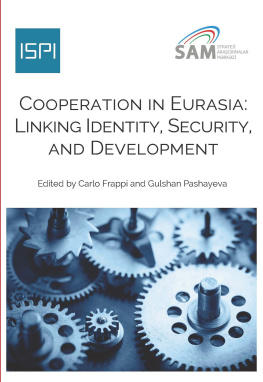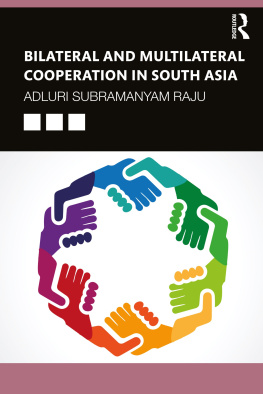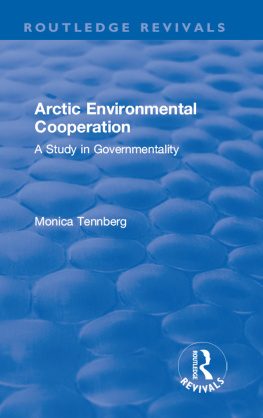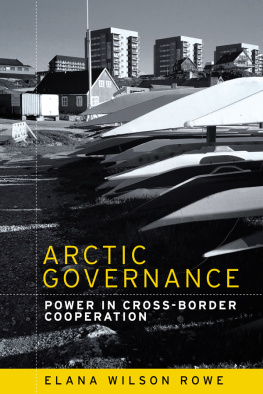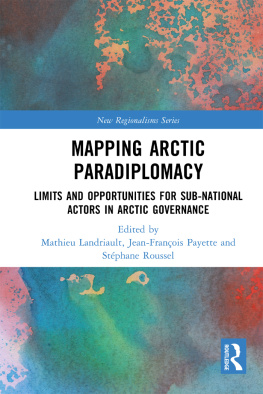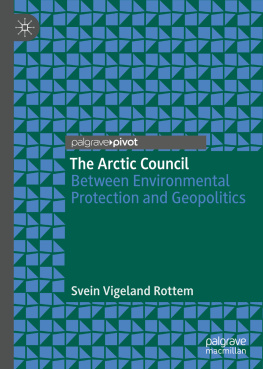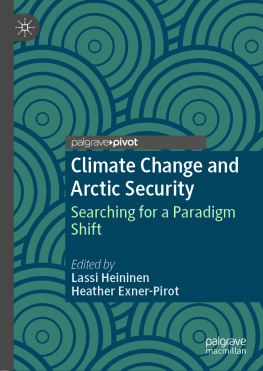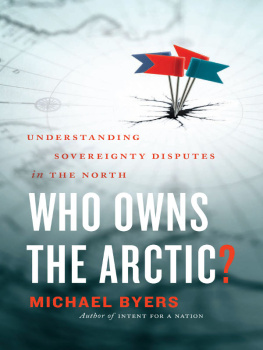POLITICS AND DEVELOPMENT IN THE NORTH AMERICAN ARCTIC
Examining the Regional Consequences of Climate Change
By
ROMAN S. CZARNY
Jan Kochanowski University in Kielce, Poland
MAGDALENA TOMALA
Jan Kochanowski University in Kielce, Poland
AND
IWONA WROSKA
Jan Kochanowski University in Kielce, Poland
United Kingdom North America Japan India Malaysia China
Emerald Publishing Limited
Howard House, Wagon Lane, Bingley BD16 1WA, UK
First edition 2021
Copyright 2021 Roman S. Czarny, Magdalena Tomala and Iwona Wroska. Published under exclusive licence by Emerald Publishing Limited.
Reprints and permissions service
Contact:
No part of this book may be reproduced, stored in a retrieval system, transmitted in any form or by any means electronic, mechanical, photocopying, recording or otherwise without either the prior written permission of the publisher or a licence permitting restricted copying issued in the UK by The Copyright Licensing Agency and in the USA by The Copyright Clearance Center. Any opinions expressed in the chapters are those of the authors. Whilst Emerald makes every effort to ensure the quality and accuracy of its content, Emerald makes no representation implied or otherwise, as to the chapters' suitability and application and disclaims any warranties, express or implied, to their use.
British Library Cataloguing in Publication Data
A catalogue record for this book is available from the British Library
ISBN: 978-1-80043-717-3 (Print)
ISBN: 978-1-80043-716-6 (Online)
ISBN: 978-1-80043-718-0 (Epub)
CONTENTS
LIST OF FIGURES AND TABLES
| Figure 1.1. | (A) Picture on the Left-hand side: The United States and Alaska (in Red). (B) International Waters Separating Russia and the United States. |
| Figure 1.2 | Greenlandic Consumption (Disposable GNI), Production (GDP), and the Block Grant including Danish State Expenditure in Billion. |
| Figure 1.3. | Gross Domestic Product in Greenland in Years (in DKK Billion). |
| Table 1. | The Payout Matrix in the Prisoner's Dilemma Concept. |
| Table 1.1. | Federal Support to the Territories in 2018/2019. |
| Table 3.1. | Total Score for National Implementation Action Progress in Each Assessment Area. |
LIST OF ABBREVIATIONS
| ACIA | Arctic Climate Impact Assessment |
| AEPS | Arctic Environmental Protection Strategy |
| AGP | Arctic Governance Project |
| AMAP | Arctic Monitoring and Assessment Program |
| ANFP | Arctic and Norther Policy Framework |
| CARC | Canadian Arctic Resources Committee |
| CAFF | Conservation of Arctic Flora and Fauna |
| CLCS | Commission on the Limits of the Continental Shelf |
| ECS | Extended Continental Shelf |
| IASC | International Arctic Science Committee |
| ICC | Innuit Circumpolar Conference |
| IPCC | Intergovernmental Panel on Climate Change |
| PAME | Protection of the Arctic Marine Environment |
| NWT | Northwest Territories |
| NASA | National Aeronautics and Space Administration |
| PCIJ | Permanent Court of International Justice |
| RCMP | Royal Canadian Mounted Police |
| TFSDU | Task Force on Sustainable Development and Utilization |
| UNCLOS | United Nations Convention on the Limits of the Continental Shelf |
| UNDRIP | United Nations Declaration on the Rights of Indigenous Peoples |
| WWF | World Wildlife Found |
ABOUT THE AUTHORS
Roman S. Czarny, PhD Assistant Professor at the Department of Law and Social Sciences of the Jan Kochanowski University in Kielce, Poland. Graduate of Jagiellonian University in Krakw (MA in English) and California State University in Dominguez Hills (MA in TESL, English Rhetoric and Composition); received his doctorate in Social Sciences at the University of Kielce; Consul of the Republic of Poland in Los Angeles (19911997, 20002004) and Chicago (19992000); specializes in public and cultural diplomacy, diplomatic, consular and foreign relations, international security and climate change, and the US and Arctic issues; published translator of literary and scientific books, essays, articles, film, and TV subtitles. Author of several scholarly articles and two monographs, the latest one: The United States as an Arctic Country.
Magdalena Tomala, PhD, hab. Professor at the Department of Law and Social Sciences of Jan Kochanowski University in Kielce; specializes in international relations in the Baltic Sea region, the Nordic region, and the Arctic area; author of two monographs. One of them Greenland in the System of International Relations in the Light of the Theory of World-Systems by Immanuel Wallerstein relates to the Arctic North. Editor of two collective publications and three journals.
Iwona Wroska, PhD, hab. Professor of Political Science at the Department of Law and Social Sciences of the Jan Kochanowski University in Kielce. Completed her PhD and habilitation in Comparative Politics (Silesian University, Katowice); fellow at the Faculty of Social and Political Sciences, Cambridge University, UK; research associate at the Department of Political Science and EURUS, Carleton University, Ottawa, Canada; specializes in comparative dimensions of various policies comprising the North. Author of several scholarly articles and three monographs.
Introduction
It was the best of times, it was the worst of times, it was the age of wisdom, it was the age of foolishness, it was the epoch of belief, it was the epoch of incredulity, it was the season of Light, it was the season of Darkness, it was the spring of hope, it was the winter of despair.
from Charles Dickens' A Tale of Two Cities
The quotation from Charles Dickens' book may best describe the situation of the Arctic today. On the one hand, it has become a crossroads of international politics and the center of attention for the whole world, but on the other, the region is undergoing such profound changes and at such an alarming rate that fairly soon it may be altered forever and beyond repair. It is good to be famous, but it is possibly better to be prominent for all the right reasons.
It may well be true that the Arctic is still a very mythical region, but it has recently certainly come to the forefront of world affairs. The area is going through a very important if not dramatic transformation due to climate changes which always heralded some change of direction for humanity. It is the climate indeed that is the most characteristic feature of the Arctic. The impending global warming, in a way, has brought globalization to the Arctic, which does not serve well the people living there and drastically changed the environment. The region has become famous because of the rapidly changing weather patterns. The Arctic has also served another purpose: it has brought to humanity the awareness of interconnectedness of everything that is occurring on our planet. Changing weather also made other issues very visible to the global community and especially to those in the region or close to it. Solving them seems to require a concerted effort of all interested parties, or possibly the whole world, and it remains to be seen if the damage can be mitigated or reversed at all. The problems include a plethora of concerns which will be discussed throughout this book.

